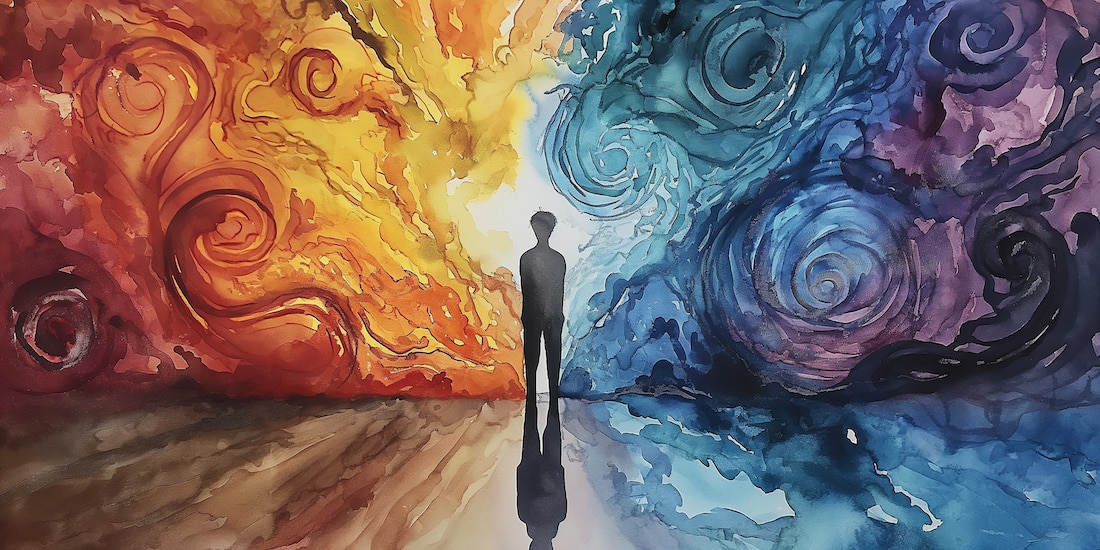Many people experience anticipatory holiday stress. For some, stress serves to motivate, for others, stress can be debilitating. Bipolar disorder affects over 2.6% of the US population, with 83% of those being severe cases. Individuals will often experience high and low moods, and the levels of increased holiday stress can often intensify the symptoms of mania and depression. Bipolar disorder and other mental health conditions can make the holiday experience one of overwhelming emotion, mood instability, confusion, anxiety, depression, hopelessness, and isolation if we fail to pay attention to a few very important daily life management tools.
What is bipolar disorder?
To understand the challenges around the holidays, we need to understand the cause and symptoms of bipolar disorder.
Bipolar disorder is characterized by extreme changes in mood, thought, energy, and behavior. The changes in mood can last for a few hours, days, weeks, or even months. As with other mental health conditions, the symptoms can vary for each person, and symptoms can shift between severe depression to complete mania or milder symptoms of both.
Mania Episode Symptoms
- Increased physical and mental activity and energy
- Euphoria
- Lessened need for sleep
- Uncharacteristically poor judgement
- Increased sexual drive
- Heightened mood, exaggerated optimism, and self-confidence
- Provocative, intrusive, or aggressive behavior
- Easily irritated or distracted
- Reckless behavior
- Poor concentration
- Signs of psychosis
Depressive Episode Symptoms
- Prolonged sadness or empty mood
- Daily fatigue and sleeping too much or too little
- Physical pain or digestive issues
- Appetite and weight changes
- Irritability, anger, worry, agitation, anxiety
- Pessimism, loss of energy, persistent lethargy
- Feelings of guilt and worthlessness
- Inability to concentrate, indecisiveness
- Thoughts of death/suicide
There is no exact cause of bipolar disorder, however, it is thought to be genetic, as individuals inherit the disorder and environmental factors such as traumatic or distressing life events trigger symptoms. Brain development, structure, and neurotransmitters are also thought to contribute to bipolar disorder symptoms.
What are coping strategies for the holidays?
Dr. Julie Eberwein, Associate CEO and Clinical Administrator, shared, “We can maintain stability through challenging holiday times by paying attention to our routine and maintaining a schedule that works during non-holiday times. Research shows that the loss of one night of sleep is enough to set the stage for mood instability. Maintaining a consistent wake-up time, eating balanced meals, taking medication as prescribed, exercise, and going to bed at approximately the same time each night is a recipe for staying on track.”
Paying attention to how we feel as we prepare for and participate in holiday events can also help us identify how much of ourselves we have available to invest. Being present in the moment motivates mental wellness. Being present and self-aware during holiday times can make a vital difference in successfully maintaining a healthy personal balance, ultimately avoiding feeling overwhelmed, confused, anxious, or depressed.
How is bipolar disorder treated?
Bipolar disorder can be successfully managed, but treatment must be individualized based on the symptoms. At Pasadena Villa, our certified professionals work with residents to develop a customized treatment plan using the most advanced evidence-based methods available. A combination of individualized and group therapy is essential in treating bipolar disorder.
Cognitive Behavioral Therapy (CBT) helps residents change the negative thinking and behaviors associated with depression, which over time leads to an improvement in mood and a positive outlook. Our modalities are combined with a social integration framework. The Pasadena Villa Social Integration Model TM combines recreational, social, and life-skill activities to help residents in assimilating into everyday life and regaining control of their lives. Residents are introduced to hands-on involvement in relevant, real time life strategies within the community, allowing our clinical team to observe residents and instantly intervene, as needed, in real time.
We understand that not everyone’s recovery follows the same path. For that reason, we offer multiple levels of care, including residential, partial hospitalization, intensive outpatient, and outpatient. Each level of care provides clients with individualized treatment, education, and support. Our goal is to provide strategies that help our residents achieve the highest level of functioning and independence once they leave treatment.



